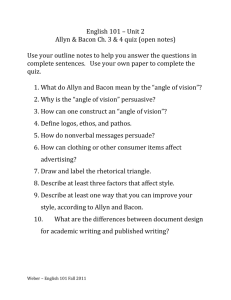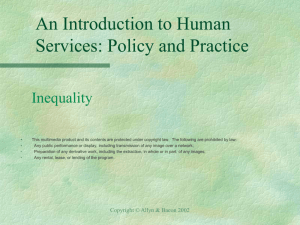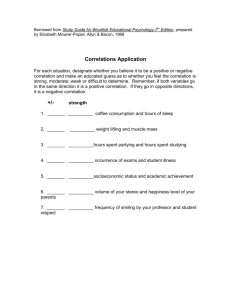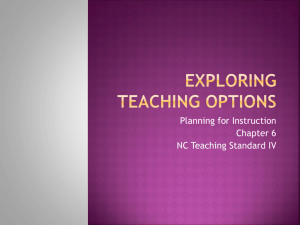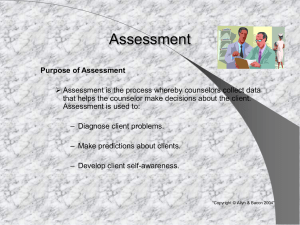INTRODUCTION TO PSYCHOLOGY Chapter 1
advertisement
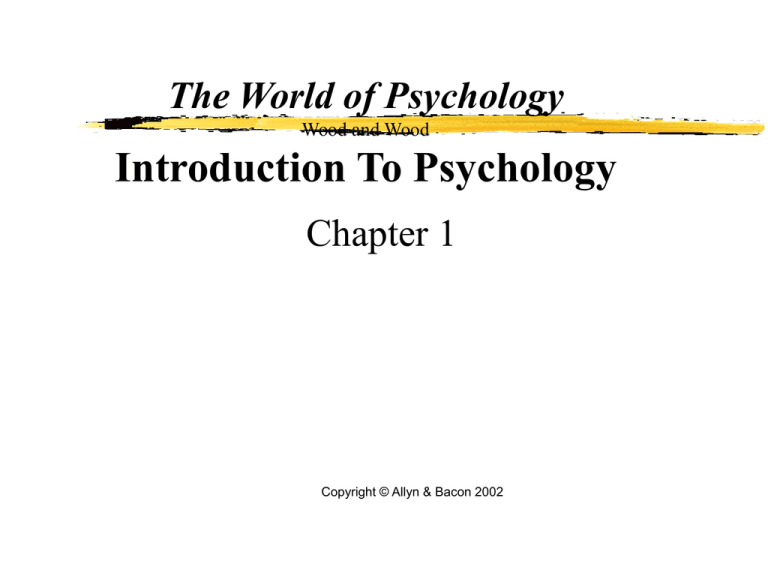
The World of Psychology Wood and Wood Introduction To Psychology Chapter 1 Copyright © Allyn & Bacon 2002 Just what is Psychology? Psychology conjures up images of mental disorders and abnormal behavior. Psychologists do study the strange and unusual, but they are interested in the normal and commonplace as well. Just what is psychology? Today psychology is defined as the scientific study of behavior and mental processes. Science or common sense? 1. Memory is more accurate under 6. Eyewitness testimony is often hypnosis. unreliable. 2. All people dream during a night of 7. Children with high IQs tend to be normal sleep. less able physically than their peers. 3. As the number of bystanders at an 8. Creativity and high intelligence do emergency increases, the time it not necessarily go together. takes for the victim to get help 9. When it comes to close personal decreases. relationships, opposites attract. 4. Humans do not have a maternal 10. The majority of teenagers have instinct. good relationships with their 5. Older adults tend to express less parents. satisfaction with life in general than younger adults.whether each statement is true (T) or false (F). Indicate Science or common sense? All of the odd-numbered items are false, and all of the even-numbered items are true. So, common sense, alone, will not take you very far in your study of psychology. Scientific Method Identify a Research Problem Design a Study Collect and Analyze Data Draw Conclusions Communicate findings Copyright © Allyn & bacon 2002 How does the scientific method work? From: Ask GeoMan... The classical approach to solving anything in science starts with a "problem," which through experimentation and prediction, evolves through the "hypothesis" and "theory" stages into a scientific "law." (Formal Definition) The Scientific Method The scientific method consists of the orderly, systematic procedures that researchers follow as they identifya research problem, design a study to investigate the problem, collect and analyze data, draw conclusions, and communicate their findings. How does the scientific method work? Ask GeoMan... 1. Wild and Crazy Idea If we assume that all science starts as science fiction, I like this terminology better than just calling it a ”research problem." Getting beyond this involves setting up experiments to verify your idea. How does the scientific method work? Ask GeoMan... 2. Hypothesis If your experimental data fail to support your idea, you'll need to go back to Step 1. If your experiments do support your idea, move on to Step 3. How does the scientific method work? Ask GeoMan... 3. Theory Great, your experiments support your hypothesis, and you are now the proud owner of a theory. Getting beyond this into the law stage requires that you can use your theory to predict the results of additional work, and that your predictions hold. As before, if they don't, return to an earlier step and try again. If your predictions hold consistently, move on to the next stage. How does the scientific method work? 4. Law This is where most discussions of the scientific method end. However, I (GeoMan) feel two additional steps are almost guaranteed to occur. “scientific law: 1. A natural phenomenon that has been proven to occur invariably whenever certain conditions are met. 2. A formal statement describing such a phenomenon and the conditions under which it occurs.” Also just called a law. http://www.webref.org/geology/s/scientific_law.htm How does the scientific method work? 5. Dogma Laws tend to be supported to such an extent that they almost become dogma. Take gravity for example. When is the last time you dropped a pencil and it floated away. Pretty stupid idea, huh? We are all so sure that gravity is THE LAW that we don't even consider the possibility that there may be exceptions or situations when it breaks down and doesn't work. This leads to the last and final stage: How does the scientific method work? 6. Stagnation This is the death of scientific thought, and should have no place in YOUR thoughts. Question all scientific laws, especially the ones that are the most firmly steeped in dogma. (But don't be stupid about it - throwing yourself off a cliff to test gravity doesn't make much sense!) The Goals of Psychology Description Explanation Prediction Control Copyright © Allyn & Bacon 2002 Descriptive Research Methods Naturalistic and Laboratory Observation Case Study Survey Research Experimental method Correlational method Meta-Analysis Copyright © Allyn & Bacon 2002 See table on Page 18! Descriptive Research Methods Naturalistic and Laboratory Observation Descriptive Information Observer Bias & Influence Minimal control Case Study Survey Research Copyright © Allyn & Bacon 2002 Descriptive Research Methods Naturalistic and Laboratory Observation Case Study Small sample but Deep Misintrepretation Time consuming Survey Research I disagree with authors here. Case Studies are frequently used in other disciplines. MBAs frequently use method. Copyright © Allyn & Bacon 2002 Descriptive Research Methods Naturalistic and Laboratory Observation Again, the authors Case Study have a narrow view. This technique is Survey Research frequently used in market research. Descriptive Information Large numbers => good stats Bias possible but not by professionals Experimental Method Manipulate Hypothesis Independent Variable Dependent Variable Experimental Group Control Group Generalize Findings Problems Selection Bias Placebo Experimenter Bias Measure Copyright © Allyn & Bacon 2002 The Correlational Method Relationships not Causes Correlation Coefficient Correlation and Prediction Copyright © Allyn & Bacon 2002 The Correlational Method Correlation is NOT Causation! Copyright © Allyn & Bacon 2002 Correlation Example cont. 1st Qtr 2nd Qtr 3rd Qtr 4th Qtr 20.4 27.4 90 20.4 30.6 38.6 34.6 31.6 45.9 46.9 45 43.9 East West North 0.621825 West vs North East vs West 50 50 45 40 35 30 25 20 45 West West 0.234512 40 35 30 25 20 0 20 40 60 East 80 100 0 50 North 100 Correlation Examples Yet another Correlation Example pulmonary anatomical dead space Psychological Research Ethics in Research Human Participant in Psychological Research Bias in Psychological Research Use of Animals in Psychological Research Copyright © Allyn & Bacon 2002 The History of Psychology Schools of Thought Structuralism Functionalism Gestalt Behaviorism Psychoanalysis Humanistic Cognitive Evolutionary Wundt & Titchener William James Wertheimer Watson & Skinner Freud Maslow & Rogers Chomsky Cosmides and Tooby Copyright © Allyn & Bacon 2002 Women and Minority Pioneers in Psychology Christine Ladd-Franklin Mary Whiton Calkins Margaret Floy Washburn Francis Cecil Sumner Albert Sydney Beckham Kenneth Clark Jorge Sanchez Copyright © Allyn & Bacon 2002 Modern Perspectives in Psychology Biological Perspective Cognitive Perspective Neuroscience Humanistic Perspective Psychoanalytic Perspective Behavioral Perspective Evolutionary Perspective Sociocultural Perspective Holding Declining Copyright © Allyn & Bacon 2002 Increasing Psychologists at Work Clinical Generalists Counseling Basic Research Industrial/Organizational School Psychologists Other Educational Developmental Psychologists Social Psychologists Copyright © Allyn & Bacon 2002 44% 17.5% 11% 7% 4% 4% 4% 3% 3% 2.5%
